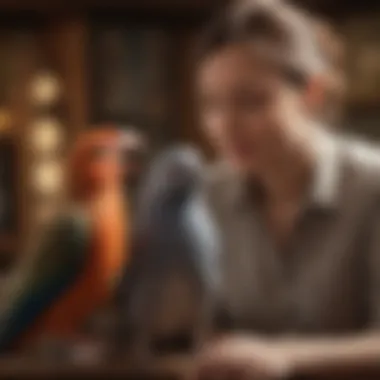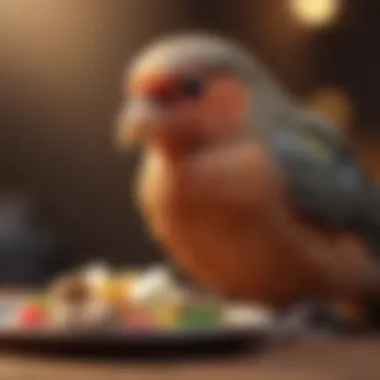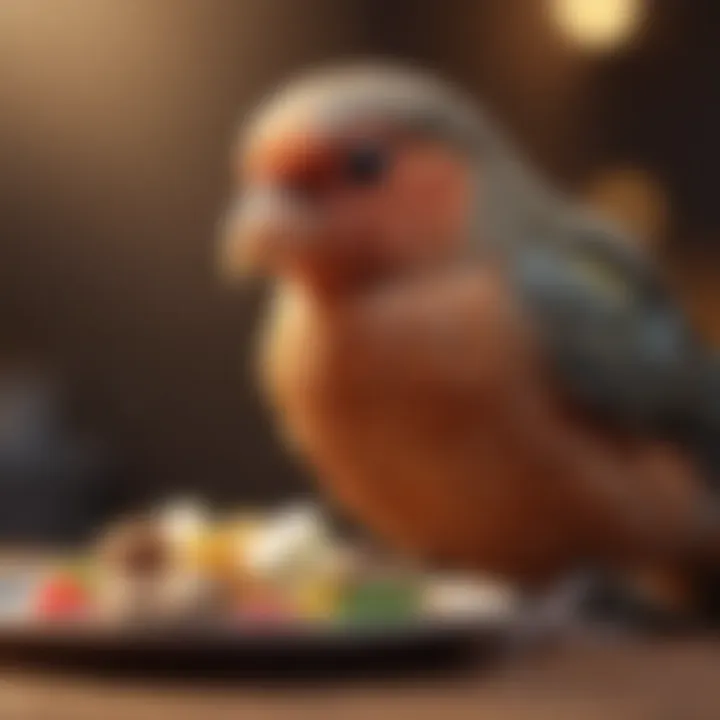Caring for Pet Birds While Expecting a Baby


Intro
Caring for pet birds takes a special kind of finesse, especially when there's a new family member on the way. The intersection of raising tiny humans and feathered friends creates a unique set of challenges and considerations. It’s a dance of attentiveness, ensuring that both the birds and the unborn child thrive in a harmonious environment. While many anticipate the joy a baby brings, pet owners may realize their avian companions have specific needs that shouldn't be overlooked during pregnancy.
As the due date approaches, expectant parents need to tap into some key strategies to support their feathered pals while making room for the upcoming arrival. This article serves as a compass, guiding both seasoned bird enthusiasts and newcomers through the essentials of pet bird care during this transformative time. We'll explore everything from daily routines to behavioral insights and nutrition guides, ultimately creating a holistic approach to keeping both your baby and birds safe and sound.
Care Tips
Maintaining a safe and nurturing environment is paramount when balancing bird care with the rigors of pregnancy. Each bird has its unique personality and requirements, so understanding what works best for each species becomes critical. Here’s how to ensure your beloved birds remain happy and healthy during this period.
Daily Care Routines
Daily routines offer a comforting structure, not only for the birds but also for the expectant parent. When managing these schedules:
- Morning Feedings: Start each day with feeding your birds. Ensure their water and food bowls are clean and filled with the right nutrition.
- Interaction Time: Spend some bonding moments, even if it's just a few minutes talking to them or letting them play outside of their cage.
- Regular Check-ins: Observe their behaviors throughout the day to catch any red flags early – things like reduced activity or appetite could indicate stress or illness.
Cage Setup and Maintenance
An organized and well-maintained cage is the foundation of pet bird care. Here are some essentials to keep in mind:
- Space Matters: Ensure the cage is spacious enough for your birds to stretch their wings and move around freely.
- Placement is Key: Keep their cage in a quiet area away from the hustle and bustle of everyday activities, reducing stress for both your birds and the unborn child.
- Regular Cleaning: Committing to a cleaning regimen prevents the spread of germs; clean the cage and change bedding often.
Hygiene and Cleaning Practices
With a little one on the way, cleanliness becomes even more crucial. To mitigate potential health risks:
- Frequent Sanitization: Regularly clean food and water containers with bird-safe disinfectants.
- Wipe Down Surfaces: Areas where the cages sit should be wiped down regularly to keep any dust or dander in check.
- Personal Hygiene: Always wash your hands after handling birds or cleaning their cages to maintain a safe environment.
Seasonal Care Adjustments
Consider the seasons as they can affect bird behavior and health.
- Temperature Control: Ensure that the cage is in a well-ventilated area, avoiding any drafts or excessive heat during summer or winter.
- Humidification in Winter: Adding humidity can be beneficial for respiratory health, especially in colder months.
- Light Cycles: Birds need a consistent light cycle; be mindful of how different seasons may alter this.
Maintaining a routine tailored to both the baby and your birds ensures that everyone can adapt smoothly during pregnancy and after the little one arrives.
In the following sections, we will dive deeper into the behavioral insights, nutrition guides, wellness and health, and enriching activities your birds need during this time. Understanding these aspects will further equip you to create a nurturing environment suitable for both your growing family and your pet birds.
Understanding the Dynamics of Pet Birds and Pregnancy
The Role of Pet Birds in Family Life
Birds, in many homes, serve not just as pets but as companions, bringing a unique joy and vibrancy that can uplift spirits. They often engage with family members, mimicking sounds, or even interacting playfully, which fosters a sense of community. As families grow, integrating the pet bird into the new routines can create a nurturing environment for both the parent and the pet.
- Emotional Support: Just by fluttering around, singing, or interacting, birds can offer emotional solace. Their presence can ease feelings of stress during pregnancy.
- Children's Learning: For families with existing children, having a bird can initiate conversations about responsibility and care for living beings, fostering empathy even before the new arrival.
However, having birds during pregnancy isn’t all sunshine and rainbows. Prospective parents must consider the potential challenges that could arise, especially in terms of maintaining the cleanliness and hygiene standards necessary for a newborn. An important aspect is ensuring that the bird's environment does not become a breeding ground for allergens or disease.
Pregnancy: A Time of Change
Pregnancy signifies a plethora of changes—not just physical, but emotional and environmental as well. Expectant parents often find themselves in a whirlwind of adjustments, and this can inadvertently affect the bird’s behavior. Hormonal changes can alter how a person interacts with their pet bird, often leading them to become more sensitive or reactive to their environment.
Moreover, the routine they once followed may be disrupted as they prepare for the baby’s arrival.
- Behavioral Shifts: Birds are perceptive creatures. They can pick up on their owner's stress levels or changes in routine, causing them to act out or grow anxious in response to the upheaval.
- Environmental Adjustments: Preparing a nursery could mean reconfiguring spaces where the bird is typically active. Understanding how to create a peaceful environment for both the pet and the upcoming newborn is essential.
Through careful planning and a willingness to adapt, the household can evolve into a harmonious living space. This adaptability will not only ease the transition for the new parents but also ensure that the bird’s welfare remains a priority, reinforcing the value of their companionship.
"Birds often mirror the emotions of their owners—keeping calm around them can help facilitate a peaceful coexistence during pregnancy."


Taking into account the unique traits of pet birds alongside the life-altering journey of pregnancy forms the crux of effective bird care in this period. The more understanding a person possesses about both sides of this equation, the smoother the transition into parenthood will likely be.
Health Considerations for Expectant Parents
When expecting a child, the world often focuses on maternal health, providing attention to the health of the unborn baby. However, when there are pet birds in the household, it’s crucial to factor their well-being into the equation too. Understanding the health considerations in the context of pet bird care can help create a safer, harmonious environment for both the parent-to-be and their feathered companions.
Considering how birds and babies interact offers insights into potential health risks – be it through hygiene practices, allergies, or illness signs. It’s important for expectant parents to maintain a vigilant eye on both avian friends and newborns, ensuring that all members of the household flourish.
Hygiene and Disease Prevention
One of the foremost aspects to consider when pets are part of the equation revolves around hygiene and disease prevention. Pet birds can carry pathogens that, while not typically a threat to healthy adults, may pose risks to pregnant individuals.
- Regular cleaning routines are essential. Birdcages should be cleaned frequently, as droppings can be a source of bacteria and parasites. The flooring around the cage should be washed often to reduce odors and maintain a tidy environment.
- Hands should be washed after handling birds, their food, or their cages. This simple measure goes a long way in minimizing the transfer of potential pathogens. Wash them rigorously, using soap and warm water, especially before eating or touching face.
- Ensure proper ventilation in the bird's area to reduce airborne particles and potential allergens.
- Avoid sharing food or drink with your birds. It seems natural to want to share snacks with pets, but this can lead to cross-contamination and health issues.
Implementing these practices may help in not just reducing the risk of disease, but also promoting healthy interactions. Parents should consult their avian vet to discuss any additional precautions that might be necessary, tailoring approaches for specific bird species.
Allergic Reactions and Bird Dander
Birds, regardless of how lovely their chirps are or how colorful their feathers can be, may also introduce allergens into the home. Allergic reactions to feathers, dander, and droppings can become problematic, especially for expecting parents who may suddenly become more sensitive to allergens.
- Identify sensitivities: If you or your partner experience sneezing, itchiness, or breathing issues while around birds, it might indicate an allergy. Consider seeking medical advice to confirm potential allergies and consequences.
- Regular grooming: Keeping birds well-groomed can significantly reduce loose feathers and dander in the air. It's advisable to appoint a non-pregnant family member or friend to handle the grooming, or, if necessary, to schedule regular visits with an avian groomer.
- Air filtration: Investing in HEPA filters can help keep the environment clean by trapping dander and other allergens.
"A clean feathered friend is a happy friend! Maintaining cleanliness isn't just about the birds; it's about everybody's health in the household."
By keeping a close watch on hygiene and managing allergens, expectant parents can reduce potential risks and safeguard both their health and that of their pets. Creating a balance that respects the needs of your feathered family members and your health will foster a nurturing environment during this peculiar yet joyful time.
Evaluating Avian Behavior Around Pregnant Owners
Understanding how birds behave around their pregnant owners is essential in maintaining a harmonious environment. Just like any other family member, birds can sense changes in their humans' emotional states. When a pregnant person undergoes fluctuations in mood or physical wellbeing, pet birds may react differently.
Monitoring avian behavior during this time is beneficial for several reasons. First, it helps identify any shifts in your bird's comfort level. Birds, known for their keen instincts, pick up on the changes happening around them. If a bird feels insecure or anxious due to their owner's condition, they may become more vocal or withdrawn. Therefore, being attuned to a bird's behavior enables owners to act proactively to ensure both the bird's and the owner's comfort.
Changes in Bird Behavior
Birds can exhibit various changes in behavior during pregnancy. A notable shift you might notice is a heightened level of curiosity. They might perch closer to their owners or watch more intently as daily routines change.
Conversely, some birds may become subdued or isolate themselves more than usual. This could stem from several reasons, including feeling neglected as the owner's attention is divided, or simply having an innate sense of the human body's shifts. Furthermore, changes in vocalization are common; some birds may chatter more excitedly or, alternatively, become quieter. Regularly observing these trends can help owners to better understand their feathered friends’ feelings.
- Increased vocalization: Birds might become chattier, mimicking the new sounds in the home, or seeking attention more actively.
- Goal-oriented behavior: Birds may display more strategic behaviors, such as attempting to get closer during bonding time or trying to play with the owner's belly.
- Routine adjustments: Changes in feeding habits or sleep cycles may appear noticeable, indicating your avian companion is reacting to the shifts in household dynamics.
Signs of Stress in Birds
Identifying stress indicators in birds during pregnancy also warrants attention. Birds may manifest stress in subtle ways that can be easily missed. Common signs include:
- Feather plucking: A nervous bird might self-mutilate by plucking its feathers due to anxiety.
- Aggressive behavior: Increased aggression towards toys or humans can signal that your bird is feeling overwhelmed. Keep an eye out for a sudden flare in territorial behavior or nipping.
- Loss of appetite: If your bird seems uninterested in its food, this could indicate stress, especially if this behavior persists.
Be proactive. If you see these signs frequently, consult with an avian veterinarian or a pet behaviorist.
"Your pet bird's well-being directly correlates to your overall family health during pregnancy. Awareness is key."
By understanding these behavioral changes and spotting stress markers, you not only nurture your bond with your avian companion but also create a more balanced living environment. This attentiveness ensures that your feathered friend feels included and understood during this transient period.
Creating a Safe Environment for Birds During Pregnancy
Creating a safe environment for birds during pregnancy is not just a matter of convenience; it’s essential for the well-being of both expectant parents and their feathered companions. Pet birds can be sensitive creatures, and any changes in their surroundings can lead to increased stress, which is the last thing that a pregnant parent or their bird needs during this time of transition. Establishing a safe and nurturing environment helps to mitigate risks and ensures that both the baby and the pet birds coexist comfortably.
Cage Placement and Accessibility
When setting up a safe environment, cage placement plays a crucial role. The cage should be positioned in a high-traffic area where the birds can remain part of the family dynamics without being overwhelmed. Avoid placing the cage in areas prone to drafts or extreme temperatures, as birds can't adapt as easily to these fluctuations. It’s advisable to keep the cage away from direct sunlight to prevent overheating during warmer months, whilst also ensuring they receive some natural light for their well-being.
Accessibility is equally important. Make sure the cage is easy to reach for feeding and cleaning. Don’t make it feel isolated—creating a sense of community makes birds feel more secure. A good option is to have a perch nearby for the birds to observe their surroundings. This can help them adjust to the upcoming family changes. Nesting materials and toys should also be within reach to encourage interaction without placing undue strain on the birds or the parents.


Minimizing Noise and Stressors
Birds are not just pets; they are delicate souls who can be easily distressed by loud noises or chaotic environments. Pregnancy often brings a flurry of activity as parents prepare for a new arrival. Therefore, it’s vital to minimize noise around the birds. Soft music or white noise can help create a calming atmosphere, while sudden loud sounds should be kept to a minimum.
Identifying potential stressors is key in this process. For example, larger pets, frequent visitors, or construction work nearby can create undue anxiety for birds. It's best to set boundaries during this time. Perhaps consider a quiet room for your birds or adding sound-dampening materials if your home is particularly noisy.
"A serene atmosphere can help sustain a positive emotional state for both your feathered companions and yourself, reducing potential behavioral issues during this transitional period."
Consider gradual introductions to changes instead of sudden shifts; this applies to what can be new items in the home, new sounds, or routines. Birds may benefit from familiarizing themselves with any new equipment or décor piece weeks before they are meant to encounter them.
By thoughtfully managing their environment, expectant parents can lay the groundwork for a serene household, allowing both their birds and their family to thrive amidst change.
Nutritional Needs for Birds in a Household with Pregnant Parents
As expectant parents, the prospect of bringing a new life into the world is an exhilarating but demanding journey. This is also true for our pet birds, who rely on us for their well-being and nutrition. Just like humans, birds have unique dietary needs, especially when their environment is changing. Ensuring a balanced diet is crucial not just for the health of your feathery friend but for maintaining harmony in the household.
Taking care of one's nutritional needs serves as a cornerstone in cultivating a healthy atmosphere, both for the baby on the way and for the birds inhabiting your home. Birds are sensitive creatures, and changes in routine can affect their eating habits. Thus, understanding how to maintain an appropriate diet becomes essential. It helps avoid any possible conflicts or discomfort that might arise during this transformative period.
Keeping a birds’ diet balanced not only enhances their health but can also lessen potential stress for both the bird and the expecting parent.
Maintaining a Balanced Diet
A healthy diet for pet birds encompasses a variety of food sources. Just sticking to seeds is like feeding a child only candy — lacking the essential nutrients needed for growth and stability. Instead, consider a mixture of the following options:
- Fresh Fruits and Vegetables: Think carrots, kale, or apples. These offer critical vitamins while also serving as a delightful treat.
- Pelleted Diets: Specialized pellets provide a balanced nutrient composition, ensuring birds get what they need without the fuss of selective eating.
- Grains and Legumes: These can contribute proteins and much-needed energy. Quinoa or brown rice can make for an excellent addition.
Monitoring your bird's food intake and ensuring they consume a variety from these categories can prevent nutrient deficiencies. If they start showing disinterest or eating less, adapt their diet creatively by introducing fresh items gradually. This will also provide avenues for interaction, serving as enrichment to their mental health.
Avoiding Harmful Foods
While it’s crucial to understand what birds should eat, it’s equally important to be aware of what they should avoid. Certain foods can be toxic to birds and can lead to severe health complications. Here’s a brief rundown of foods that are off-limits:
- Chocolate: While tempting for us, it can be highly toxic for birds.
- Caffeine: Found in coffee and tea, it can cause serious heart issues in birds.
- Avocado: This contains persin, which is harmful to some bird species.
- Seeds from Fruits: Many fruit seeds, such as those from apples and cherries, can be toxic and should be removed.
As pregnancy progresses and priorities shift, make it a habit to double-check the items in your bird’s diet. Ensuring that harmful foods are completely out of reach becomes a necessary step in protecting both the birds and the future baby. It often helps to create a clear list of do's and don'ts and keep it visible around the food prep zone.
In a household preparing for a new member, understanding the specific nutritional needs of pet birds becomes integral. This ensures a smooth transition that keeps both the expectant parents and their feathered companions in good health.
Interacting with Birds During Pregnancy
Interacting with pet birds during pregnancy can be a nurturing experience for both the parents-to-be and their feathered companions. Owning a bird during this special time brings a unique set of dynamics into the family environment. Balancing the needs of both the expectant parent and the pet bird is crucial. Engaging and safe interactions can contribute to emotional well-being, reduce stress, and provide a sense of continuity in a period marked by significant change.
Safe Handling Practices
Safety is paramount when it comes to handling pet birds during pregnancy. As the body undergoes various changes, it’s essential to practice careful handling to prevent any accidents. Although many birds are gentle and enjoy human interaction, they can also be unpredictable, especially in new or stressed situations. Here are a few key practices:
- Gentle approach: Approach your bird quietly and calmly. Sudden movements can startle them.
- Stability: Always make sure you have a secure grip. Birds are lightweight but can flutter unexpectedly.
- Limit handling time: While regular interaction is important, consider shortening the duration of handling sessions. This can help avoid overwhelming both the bird and the pregnant individual.
- Avoid strenuous activities: Refrain from any play that could cause accidental injury, like spinning or tossing the bird.
Involving other family members in the care of the bird during pregnancy can also help disperse the responsibility. This supports an environment where the pregnant person can feel secure as changes unfold.
Understanding Bird Body Language
Birds, much like humans, communicate with body language. Recognizing and interpreting these signals is crucial for fostering healthy interactions during pregnancy. An expectant parent may become more sensitive to their bird’s emotional states, leading to better responses to their needs. Consider the following indicators of bird emotions:
- Fluffed feathers: This often indicates that the bird is feeling cold, scared, or relaxed, depending on the context. When relaxed, it may mean they are comfortable with their surroundings.
- Beak grinding: This is a sign of contentment. If a bird is grinding its beak, it generally means it's relaxed or sleepy.
- Tail bobbing: While it can be energetic, tail bobbing might also indicate excitement or aggression. Pay attention to whether the bird's body language appears tense during this behavior.
- Vocalizations: Listen carefully to the variety of sounds your bird makes. Changes in vocal pitch or frequency can indicate distress or satisfaction.
"Understanding a bird's body language is key to fostering a safe environment where both the expectant parent and the bird can thrive."
Monitoring Bird Health During This Transition
When a household prepares for the arrival of a newborn, the focus is quite often on maternal health and baby readiness. However, it's crucial to keep a close eye on your pet birds as well during this significant life phase. Birds are sensitive creatures, and their well-being can sometimes take a backseat amidst the whirl of pregnancy preparations. Monitoring their health during this transition is not only essential for the birds' welfare but also for maintaining a harmonious home environment.


Keeping tabs on your avian friends can provide insights that prevent potential health issues. Stress and changes in routine can cause birds to experience anxiety, leading to behaviors that may signal distress. Thus, understanding how to recognize the signs and monitoring their health plays a significant role in ensuring both your feathered companions and the future family member thrive in a balanced atmosphere.
Regular Check-ups with a Veterinarian
Regular vet visits should be a cornerstone of responsible bird ownership, but their importance becomes even more pronounced when the family is growing. Just as expectant parents schedule routine check-ups, so should pet owners prioritize their birds' health.
Routine examinations allow the vet to assess the overall health status of the birds. They can spot early warning signs of illness that might not be apparent at first glance. Regular check-ups can also serve to ensure vaccinations are up to date and monitor for any zoonotic diseases—a primary concern when preparing for a newborn.
Here are some considerations regarding vet visits:
- Frequency of Visits: Schedule check-ups at least once a year, or more often if the birds exhibit any unusual behavior.
- Documentation: Keep a health record that includes past vaccinations, any previous illnesses, and observations during the check-ups. This record can be useful for the vet to assess any changes.
- Behavior During a Visit: Some birds may feel stressed during a vet visit. It’s best to prepare them for the journey by introducing them to their carrier ahead of time. This lessens anxiety and can make the visit smoother.
Recognizing Signs of Illness
Successful monitoring of bird health hinges on the ability to recognize signs of illness early on. Birds are adept at hiding their discomfort, which can make it challenging for even seasoned bird owners to detect health issues right away.
Here are a few signs to look out for:
- Change in Appetite: If your bird starts eating less or refuses its favorite treats, it could be a sign of illness.
- Behavioral Changes: Increased aggression or sudden withdrawal can indicate stress or health problems.
- Physical Symptoms: Look for changes in droppings, feather quality, or presence of nasal discharge.
- Breathing Patterns: Observe if your bird is breathing heavily or exhibiting any labored breathing techniques.
"Birds, unlike dogs or cats, often bottle up their feelings and discomforts, making careful observation essential for their wellbeing."
In essence, transitioning into parenthood involves learning to juggle multiple care requirements, and monitoring both human and bird health ensures that everyone is content. Keeping stress to a minimum and being proactive about veterinary care can set a positive tone for welcoming a new life into the family. Thus, making the effort to check in on your birds can yield great dividends in their health and happiness.
Transitioning Post-Pregnancy: Reassessing Bird Care
Having a newborn in the house brings a whirlwind of changes that can leave even the most seasoned parents feeling a bit off-kilter. This transition also affects your pet birds. It’s vital to reassess how you care for them when the baby arrives. After all, maintaining harmony in your household is key. The loving bond between birds and their human families can thrive when attention is paid to everyone’s needs.
The primary focus during this period is ensuring the safety of the newborn while maintaining the health and happiness of your birds. This dual focus not only helps in smoothing out any possible tensions but also allows family members to adapt to their new roles seamlessly. Understanding the changes can set the stage for positive interactions and mutual respect among everyone involved.
Introducing Birds to the Newborn
When the initial excitement fades and life resumes, the time will come to introduce your feathered friends to the newest member of the family. This step should not be rushed. Birds are intuitive creatures. They can sense changes and may react differently to the new sounds and smells that a baby brings.
Steps for Prelims:
- Prepare Your Birds: Gradually acclimate your birds to the sounds of a baby. You might play baby noises at a low volume to help them get used to it.
- Supervised Meetings: Allow brief, supervised encounters between the birds and the baby. Always keep the bird's behavior in mind during these introductions.
- Positive Reinforcement: Reward your birds with treats when they behave calmly around the baby. This creates a positive association in their minds.
You must prioritize safety during these initial interactions. Ensure that the baby is at a safe distance and that the birds feel secure in their surroundings. A calm, gradual approach will go a long way in building a cooperative atmosphere.
Establishing New Routines
The arrival of a baby means that daily routines are destined to change, and pet birds are not immune to this shift. Establishing new routines not only serves the needs of your birds but also ensures a smooth transition for yourself and your family. Birds thrive on routine and may become anxious if their schedules are disrupted significantly.
Important Considerations for New Routines:
- Feeding Schedules: Stick to regular feeding times. Even slight changes can confuse your birds, so continuity is crucial.
- Interaction Time: Set specific times for bonding with your birds. Make sure they still get ample attention amidst the new demands of parenting.
- Safe Spaces: Create areas in your home that are dedicated to your birds, away from baby activities. This ensures they have a space where they can retreat if feeling overwhelmed.
Incorporating these adjustments while being mindful of your birds' needs can help mitigate anxiety that might come with all this change. By actively participating in their wellbeing, you keep their spirits high and maintain the household's balance.
Remember: Prioritize communication and observation. Changes in routines can affect your birds' behavior, so pay attention to their responses as you navigate this new landscape.
Ending: Harmonizing Household Dynamics
As the anticipation of welcoming a new member into the family grows, it’s essential to keep a keen eye on the unique dynamics between pet birds and pregnant parents. The balance between caring for a pet bird while preparing for a newborn can feel like walking a tightrope sometimes—one misstep can send the entire household into a state of disarray. However, with the right approach, this transition can not only be smooth but enriching for everyone involved.
In this article, we’ve explored various aspects of pet bird care during pregnancy, emphasizing the need for a well-thought-out approach. Understanding avian behavior, ensuring hygiene, and providing a nurturing environment for both birds and the expectant parent are all essential elements of this balancing act. Moreover, creating routines that respect the needs of both species can foster a harmonious atmosphere in the home.
Benefits of Harmonizing Household Dynamics
- Fostering Relationships: Cultivating a peaceful coexistence enhances the bond between pets and parents. Birds are sensitive creatures. Their well-being directly impacts the mother’s emotional health.
- Minimized Stress: Expecting parents often experience heightened stress levels. A well-adjusted pet bird may serve as a source of comfort and companionship during this transitional period.
- Environmental Synergy: By designing a living space that accounts for both the bird’s space and safety, as well as the safety of the baby, the household can function more harmoniously.
Considerations for a Smooth Transition
- Educate Everyone Involved: It’s critical for all family members to understand the needs of both the bird and the newborn. Little kids should learn how to interact with birds safely.
- Adapt Roles and Responsibilities: As family dynamics change, so too should the division of care for the pet bird. Delegating tasks can help ease the burden on the expectant parents while ensuring the birds’ needs are still met.
- Constant Vigilance: Observing the bird for any signs of stress or disruption during this time is vital. Any change in behavior—be it excessive vocalization or reduced activity—should prompt a closer look.
"A gentle heart is stronger than a mighty fist." - This quote reminds us that patience and understanding can lead to a thriving household, even during challenging times.















